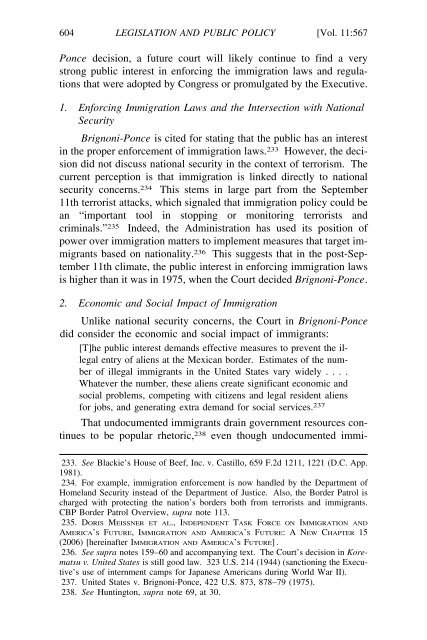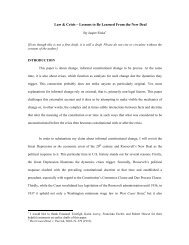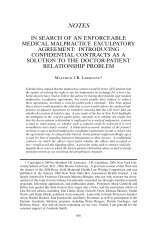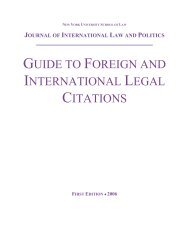updating brignoni-ponce - New York University School of Law
updating brignoni-ponce - New York University School of Law
updating brignoni-ponce - New York University School of Law
You also want an ePaper? Increase the reach of your titles
YUMPU automatically turns print PDFs into web optimized ePapers that Google loves.
604 LEGISLATION AND PUBLIC POLICY [Vol. 11:567<br />
Ponce decision, a future court will likely continue to find a very<br />
strong public interest in enforcing the immigration laws and regulations<br />
that were adopted by Congress or promulgated by the Executive.<br />
1. Enforcing Immigration <strong>Law</strong>s and the Intersection with National<br />
Security<br />
Brignoni-Ponce is cited for stating that the public has an interest<br />
in the proper enforcement <strong>of</strong> immigration laws. 233 However, the decision<br />
did not discuss national security in the context <strong>of</strong> terrorism. The<br />
current perception is that immigration is linked directly to national<br />
security concerns. 234 This stems in large part from the September<br />
11th terrorist attacks, which signaled that immigration policy could be<br />
an “important tool in stopping or monitoring terrorists and<br />
criminals.” 235 Indeed, the Administration has used its position <strong>of</strong><br />
power over immigration matters to implement measures that target immigrants<br />
based on nationality. 236 This suggests that in the post-September<br />
11th climate, the public interest in enforcing immigration laws<br />
is higher than it was in 1975, when the Court decided Brignoni-Ponce.<br />
2. Economic and Social Impact <strong>of</strong> Immigration<br />
Unlike national security concerns, the Court in Brignoni-Ponce<br />
did consider the economic and social impact <strong>of</strong> immigrants:<br />
[T]he public interest demands effective measures to prevent the illegal<br />
entry <strong>of</strong> aliens at the Mexican border. Estimates <strong>of</strong> the number<br />
<strong>of</strong> illegal immigrants in the United States vary widely . . . .<br />
Whatever the number, these aliens create significant economic and<br />
social problems, competing with citizens and legal resident aliens<br />
for jobs, and generating extra demand for social services. 237<br />
That undocumented immigrants drain government resources continues<br />
to be popular rhetoric, 238 even though undocumented immi-<br />
233. See Blackie’s House <strong>of</strong> Beef, Inc. v. Castillo, 659 F.2d 1211, 1221 (D.C. App.<br />
1981).<br />
234. For example, immigration enforcement is now handled by the Department <strong>of</strong><br />
Homeland Security instead <strong>of</strong> the Department <strong>of</strong> Justice. Also, the Border Patrol is<br />
charged with protecting the nation’s borders both from terrorists and immigrants.<br />
CBP Border Patrol Overview, supra note 113. R<br />
235. DORIS MEISSNER ET AL., INDEPENDENT TASK FORCE ON IMMIGRATION AND<br />
AMERICA’S FUTURE, IMMIGRATION AND AMERICA’S FUTURE: A NEW CHAPTER 15<br />
(2006) [hereinafter IMMIGRATION AND AMERICA’S FUTURE] .<br />
236. See supra notes 159–60 and accompanying text. The Court’s decision in Kore- R<br />
matsu v. United States is still good law. 323 U.S. 214 (1944) (sanctioning the Executive’s<br />
use <strong>of</strong> internment camps for Japanese Americans during World War II).<br />
237. United States v. Brignoni-Ponce, 422 U.S. 873, 878–79 (1975).<br />
238. See Huntington, supra note 69, at 30. R
















